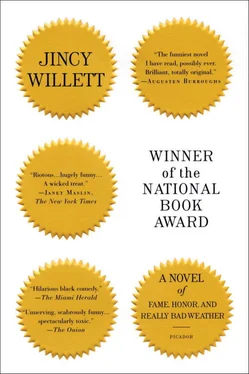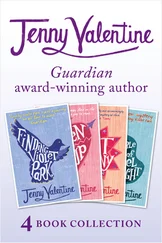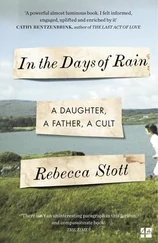Abigail Mather, giddy with drink, was the only female remaining at midnight in a stronghold of brutally healthy young men. When the beer was gone they moved out on the thick ice, sliding, at first cautiously, then with increasing confidence. They formed a long hand-linked line, which became a circle, with Abigail at the center.
She flew across the starry night with her feet tucked up under her bottom and her head thrown back, held up by the steely arms of the young men. There was laughter, and then there wasn’t, and Abigail was alone, in the middle of the frozen lake, at the center of a rough circle of men…. No one was to know what was done to her that night. Ever. Until now.
—————
Which was my fault, as I had refused to listen to her when she climbed into my bed at three in the morning, her hair filthy, reeking of dried beer, her body rank and strange. She smelled of copper and hops and fear and horses lathered by a killing run.
“Dorcas,” she said. “It’s wonderful.” My sister was trembling, in the grip, for the first time in her life, of something more powerful than herself. She squeezed one of my hips in her hand. “They’ll love you,” she said, laughing, as I tried to jerk out from under her. “They’d love you just as much. You can make them do anything! I know you’re not ready yet, but Oh, Dorcas, I wish I could show you now….”
I punched her soft stomach with all my strength. “Get out of my bed, you pig,” I whispered through my teeth. I hit her again. “Get away from me. Wash yourself. Get off me.” It was enraging not to be able to scream, to have to protect her from our parents, our parents from her. For the first time I saw my sister as a burden, and understood that I would have to carry her, in some sense, for the rest of my life. I kept punching her, and she made no move to protect herself, and everywhere my fist sank in, its small force was muffled by her flesh.
I kept hissing at her to get off me, although, literally, I was on top of her, kneeling on her thighs, wobbling precariously, and her dirty nightgown was bunched and twisted around her waist, but still she was on me, really, with her bullying musk and her appetites, and I stopped hitting her only when I saw, through the stars of my rage, that she loved it, with her eyes shut and her mouth jagged in a sow’s pink grin. I slapped her hard across the face, drawing a tear from one eye, making no difference, and then leaped away from her, hugging myself with fright.
The only effective weapon against her was indifference. I had always instinctively known that, but had not, until that night, begun to know just how horrible that was. She thrived, she prospered, on any sort of attention, like a plant on light. Even horror, disgust. Even fear. Love, disapproval, clinical interest, curiosity, outrage, hate, cold, and warm—no matter how you regarded her you were already lost, for the mere fact of your regard became her nourishment. To look at Abigail was, is, to feed the beast. To look at her with strong emotion is a kind of suicide.
She drew a bath for herself in the basement tub, so that our parents would not hear. She came back clean and cleanly dressed and got into her own bed. I lay awake until daylight with burning eyes, worrying at my parents’ innocence, my duty to preserve it, my duty to Abigail, my crippled sister, my monster, who slept deep. At one point during the night she rolled up onto her knees and slept the way she had when she was very young, with her face mashed into her pillow and her bare rump in the air. My innocence was gone forever. Hers returned, and always would, settling upon her in the night like dew. My sister manufactures innocence, like adrenalin, or sweat.
So I never learned What Happened That Night until last year, when Abigail was at the ACI and I couldn’t raise bail because it took all the money I had to retain a decent lawyer. Frank Calef was a great help to me at that time. Frank’s a banker, probably more responsible than any one other individual for the Wampum Factory Mall, and one of the City Council Yankee Impersonators who stand fast against the Italian Menace. But Yankee impersonators, like their Platonic ideal, have some virtues, the greatest of which is devotion to duty. Frank helped me out with money and made his shoulder discreetly available should I want, in an uncharacteristic (but permissible in the extreme circumstances) moment of weakness, to sag against something. I suppose he was motivated by a notion of solidarity, and if my name had been Squillante or O’Malley or Fishbein (especially Fishbein) he might not have been so willing to stand by me. Although I suspect he would have anyway, but would have missed a beat between hearing the news and offering assistance.
In any event we spent a lot of time together the first few months, drinking coffee in my parlor and talking, like characters in an old soap opera; not the new kind, with all the sex. Frank is a soap opera man, with a regular, handsome, sober face, and a ponderous, stolid tolerance for voluble females. He is sexless, too, like soap opera men. (I am as unlike Abigail as possible, but my instincts have never been in doubt. I share, along with my imprudent sister, and all imprudent sisters, a bawd’s contempt for sexless men.) Needy females made him unctuous. “I know,” he would murmur, nodding. “I know.” Organ music up and out. I remember him as a handsome boy, self-assured, twinkling, clever in a modest way; always bound for Brown and Harvard Law. What I forgot, until he reminded me one evening, was that he was first-string quarterback for Frome High in 1953, their championship year.
I went to one game in my life, when I was twelve. The boys looked robotic and stupid with their padding and their helmets. And the cheerleaders…It seems now, though this can’t be true, that I pitied them even then. I remember how pretty they were, how professionally they filled the space in which they crouched and leaped. It seems to me now that they smiled like airline stewardesses, unexcited, in control; and that in their generous, graceful display of frost-reddened thighs and pure white underpants was an unflinching awareness that this, now, was the high point of their lives and beauty; that all that remained was decline, disappointment, a lifelong footing of the bill. They smiled like the retiring Miss America. They were icons, and in my memory they always knew it. Abigail was no icon; she envied and hated the cheerleaders for their beauty and popularity. But she was happier than they were even then, and her life has had no high point, nor required one, and the only reason she bothered to envy them was her own bottomless greed.
I assumed that Frank was acting out of loyalty to his head librarian. He said, one early evening, that the town owed something to Abigail, and I laughed and said I couldn’t imagine what. Until she married Conrad Lowe she had been an embarrassment and a nuisance, everywhere at once in her mailman’s uniform, an absurd and unflattering outfit that made her look even hippier than she was, with those trousers cut for men, stretched across her buttocks and thighs, the hip pockets gaping wide, and her mailman’s hat set way back on her head, held on with long pins, framing her round wicked face.
And like Cain’s postman she was Fate itself, and when she rang the bell on Saturday the husbands came to the door, and sometimes their wives were out at Food Land, and once in a while, according to Abigail, they were just down the hall in the kitchen, scrubbing the linoleum. She poisoned half the marriages in her territory (and she covered a lot of ground) and a good many outside it, where she was only legend.
I said that if the town owed something to her, it was tar and feathers and a one-way ticket to Worcester. Frank failed to nod and murmur “I know,” but stared into his cold beige coffee and blushed. “I knew her when she was just a kid,” he finally said.
Читать дальше












